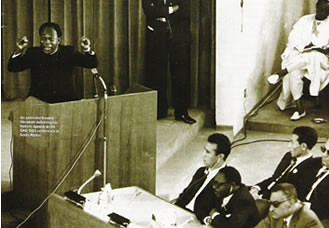
Kwame Nkrumah speaking at the Organization of African Unity Summit in 1964 in Egypt calling for a continental unity government for Africa. 2009 marked the 100th anniversary of his birth., a photo by Pan-African News Wire File Photos on Flickr.
Without unity, there is no future for Africa
Wednesday, 22 May 2013 00:00
Julius Nyerere
In May 1963, 32 independent African states met in Addis Ababa, founded the Organisation of African Unity, and established the Liberation Committee of the new organisation, charging it with the duty of co-ordinating the liberation struggle in those parts of Africa still under colonial rule. The following year, 1964, the OAU met in Cairo. The Cairo
Summit is remembered mainly for the declaration of the heads of state of independent Africa to respect the borders inherited from colonialism.
The principle of non-interference in internal affairs of member states of the OAU had been enshrined in the Charter itself. Respect for the borders inherited from colonialism came from the Cairo Declaration of 1964.
In 1965, the OAU met in Accra. That summit is not as well remembered as the founding summit in 1963 or the Cairo Summit of 1964. The fact that Nkrumah did not last long as head of state of Ghana after that summit may have contributed to the comparative obscurity of that important summit. But I want to suggest that the reason why we do not talk much about (the 1965) summit is probably psychological: it was a failure. That failure still haunts us today.
The founding fathers of the OAU had set themselves two major objectives: the total liberation of our continent from colonialism and settler minorities, and the unity of Africa. The first objective was expressed through the immediate establishment of the Liberation Committee by the founding summit. The second objective was expressed in the name of the organisation — the Organisation of African Unity. Critics could say that the Charter itself, with its great emphasis on the sovereign independence of each member state, combined with the Cairo Declaration on the sanctity of the inherited borders, make it look like the “Organisation of African Disunity”.
But that would be carrying criticism too far and ignoring the objective reasons which led to the principles of non-interference in the Cairo Declaration. What the founding fathers — certainly a hardcore of them — had in mind was a genuine desire to move Africa towards greater unity. We loathed the balkanisation of the continent into small unviable states, most of which had borders which did not make ethnic or geographical sense.
The Cairo Declaration was promoted by a profound realisation of the absurdity of those borders. It was quite clear that some adventurers would try to change those borders by force of arms. Indeed, it was already happening. Ethiopia and Somalia were at war over inherited borders.
Nkrumah was opposed to balkanisation as much as he was opposed to colonialism in Africa. To him and to a number of us, the two — balkanisation and colonialism —were twins. Genuine liberation of Africa had to attack both twins. A struggle against colonialism must go hand in hand with a struggle against the balkanisation of Africa.
Kwame Nkrumah was the great crusader of African unity. He wanted the Accra Summit of 1965 to establish a union government for the whole of independent Africa. But we failed.
The one minor reason is that Kwame, like all great believers, underestimated the degree of suspicion and animosity which his crusading passion had created among a substantial number of his fellow heads of state. The major reason was linked to the first: already too many of us had a vested interest in keeping Africa divided.
The future of Africa, the modernisation of Africa that has a place in the 21st century, is linked with its decolonisation and detribalisation. Tribal atavism would be giving up any hope for Africa. And of all the sins that Africa can commit, the sin of despair would be the most unforgivable.
Reject the nonsense of dividing the African peoples into Anglophones, Francophones, and Lusophones. This attempt to divide our peoples according to the language of their former colonial masters must be rejected with the firmness and utter contempt that it richly deserves.
The natural owners of those wonderful languages are busy building a united Europe. But Europe is strong even without unity. Europe has less need of unity, and the strength that comes from unity, than Africa.
A new generation of self-respecting Africans should spit in the face of anybody who suggests that our continent should remain divided and fossilised in the shame of colonialism, in order to satisfy the national pride of our former colonial masters. Africa must unite! That was the title of one of Kwame Nkrumah’s books. That call is more urgent today than ever before.
Together, we, the peoples of Africa, will be incomparably stronger internationally than we are now with our multiplicity of unviable states. The needs of our separate countries can be, and are being, ignored by the rich and powerful. The result is that Africa is marginalised when international decisions affecting our vital interests are made.
Unity will not make us rich, but it can make it difficult for Africa and the African peoples to be disregarded and humiliated. And it will, therefore, increase the effectiveness of the decisions we make and try to implement for our development.
My generation led Africa to political freedom. The current generation of leaders and peoples of Africa must pick up the flickering torch of African freedom, refuel it with their enthusiasm and determination, and carry it forward.
--This is an excerpt of an address by Tanzania’s first president, one of the founding fathers of the OAU, on the occasion of Ghana’s 40th independence anniversary celebrations on March 6 1997, in Accra.
No comments:
Post a Comment